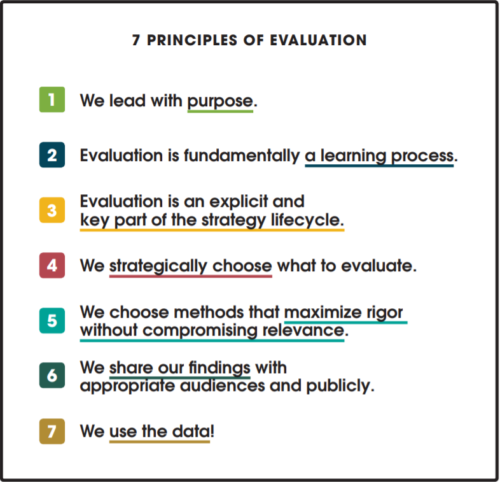How we practice effective philanthropy: Resources and guides from the Hewlett Foundation
The Hewlett Foundation’s Effective Philanthropy Group (EPG) seeks to strengthen the capacity of the foundation’s staff, its grantees and philanthropy, in general, to achieve their goals and benefit the common good. The team has staff whose roles are externally focused – making grants to strengthen nonprofits and the philanthropic sector – as well as staff whose roles are internally focused. Internally, we partner with Hewlett Foundation program staff and serve act as the foundation’s in-house experts on specific areas of philanthropic practice, such as grantmaking strategy, evaluation, progress tracking and organizational learning.
Here are some useful resources related to the team’s work. It includes guidance the team has developed, or helped create, about foundation-wide philanthropy practices. We share them publicly to support ongoing learning and serve as resources to peers and partners in the field.
A practical guide to outcome-focused philanthropy (2016)
Outcome-focused philanthropy is the Hewlett Foundation’s approach to how we approach all phases of strategy, from origination, implementation, refresh and (sometimes) exit, emphasizing rigor and results, as well as learning and adaptation. Hewlett Foundation program staff across issue areas, from performing arts to global development, use this guidance as a practical tool to shape their thinking and decision-making.
Evaluation principles and practices: Second edition (2019)
 Evaluation is, and has long been, an important tool to help us learn and improve our strategies at the Hewlett Foundation. The purpose of this document is to provide a refreshed description of our philosophy, purpose, and expectations specifically regarding evaluation; to clarify staff roles; and to outline available support.
Evaluation is, and has long been, an important tool to help us learn and improve our strategies at the Hewlett Foundation. The purpose of this document is to provide a refreshed description of our philosophy, purpose, and expectations specifically regarding evaluation; to clarify staff roles; and to outline available support.
Benchmarks for spending on evaluation (2014) and Evaluation quality assessment (2018)
The first paper, a distillation of a memo prepared for the foundation’s board, articulates benchmarks for the expected costs of evaluating our grantmaking programs’ progress and outcomes. The second paper, based on an in-depth examination of nearly 50 evaluations commissioned by the foundation in recent years, assesses the actual spending and the quality of those evaluations.
Evaluation Roundtable case of the Hewlett Foundation history of evaluation (2016)
This teaching case study describes the evolution of the evaluation function at the foundation from 2000 to 2015. It was prepared for the Evaluation Roundtable, a network of foundation evaluation leaders in the U.S. and Canada that seeks to support and improve evaluation practice in philanthropy. It has been taught at the Evaluation Roundtable, the American Evaluation Association and Stanford University.
Assessing nonprofit capacity: A guide to tools (2017)
This study provides an overview of organizational assessment tools designed to help both funders and nonprofits better understand a nonprofit’s health and capacity – areas of relative strength and weakness. It includes a database of nearly 100 tools, checklists and guides for organizational assessment.
Listening to the people we seek to help (2017)
Feedback from the people we seek to help makes our work better. There are many ways that funders listen—and more tools available that enable better, more efficient listening—which this document highlights.
Tracking progress: Setting, collecting, and reflecting on implementation markers (2018)
This guide is a deep dive into implementation markers—what they are and how to set, collect, reflect on and use them.



